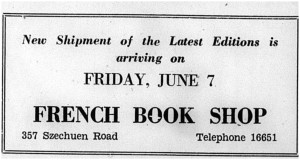A Little Old Shanghai with your Bloomsday
Posted: June 16th, 2015 | No Comments »Today, June 16th is Bloomsday! If you’re not a James Joyce aficionado June 16 is the day all of the events in Joyce’s Ulysses take place. It also happens that, of late, there have been rather a lot of stories regarding the supposed popularity of Ulysses and Finnegans Wake in China (such as here). And so a little Joycean-related tale from old Shanghai…one author who may actually be having an easier time getting published in Communist China than he did in Republican China…
In September 1940 the Shanghai Municipal Police (SMP) took upon itself the task (and considering Shanghai was surrounded by the Japanese army and the war drums were beating loud one wonders if they didn’t have anything better to do!) of launching a concerted campaign to ensure that no English language books deemed ‘unfit for public sale’ (or “salaciousâ€) should be available in the territory of the International Settlement. The campaign began by seizing several copies of various D.H. Lawrence and Joyce novels available in both foreign and locally operated bookstores.
Events began on September 5th 1940 when the Chinese-owned and managed Modern Book Company’s branch at 357 Szechuan Road (now Sichuan Middle Road) was visited by officers of the SMP. A number of English language books were confiscated and delivered to Detective Superintendent (DSI) S.A. Young at Shanghai Special Branch. Titles confiscated included D.H. Lawrence’s Lady Chatterley’s Lover, Alexander Kuprin’s Yama: the Pit (concerning prostitution in Russia), James Joyce’s Ulysses, Theodoor van der Velde’s Ideal Marriage: Its Physiology and Technique and a book entitled Sex Life in France. These seizures were followed by confiscations of Lawrence’s Women in Love, The Rainbow, The Woman who Rode Away, Aaron’s Rod, The White Peacock, Sons & Lovers, Lovely Lady, The Ladybird and The Lost Girl as well as a collection of Lawrence stories, A Modern Lover. There were also several books not by Lawrence confiscated including Ely Culbertson’s The Strange Lives of One Man, a rather racy, for the time, memoir by a contact bridge player and rampant self-publicist. Additionally, a number of non-fiction titles were also seized including Theodoor van der Velde’s Sex Hostility in Marriage: Its Origin, Prevention and Treatment and Sex Techniques in Marriage, as well as Victor Robinson’s Encyclopaedia Sexualis and, finally, a book entitled The Power to Love. All of these books were essentially early sex manuals.
Eventually all of these titles were deemed “OK†by the SMP Translation Office with the exception of Lawrence’s Lady Chatterley, Kuprin’s Yama: the Pit and Joyce’s Ulysses. And so the police moved to other bookshops in the Settlement and proceeded to seek out copies of Lawrence, Kuprin and Joyce. By the end of 1940 Lawrence, Kuprin and Joyce were not to be found on the shelves of the International Settlement’s bookshops.
Of course Ulysses had long suffered censorship and banning in the UK and USA. However, a couple of things to note that make this 1940 SMP campaign against Joyce in Shanghai interesting:
1) Technically the SMP could censor whatever it felt it appropriate under the prevailing political situation in the International Settlement. However, in general terms, it seems they followed the censorship trends pertaining in Great Britain at that time. However, by confiscating and seizing for destruction copies of Joyce’s Ulysses they were extending their writ, as England had already rescinded its ban on Joyce’s novel four years earlier in 1936.
2) A number of copies of Ulysses seized by the SMP in Shanghai were returned to a book wholesaler in Tientsin (Tianjin) that supplied English language books throughout China. The copies returned to Tientsin were then reportedly placed back on sale in that treaty port which had its own, separate, censorship regime, municipal police system and local government organisations who never bothered to launch a crackdown.
Effectively with the crackdown in 1940 the SMP appears to have been making judgements independently of those being taken both in other countries and in other China treaty ports. They didn’t like Ulysses and so it was banned…
The French Book Store was run by a Mr. Bonardel, a French national. The bookstore sold French and English language titles as well as materials in some other European languages. The shop shared premises with the Modern Book Company at 357 Szechuan Road.

Leave a Reply